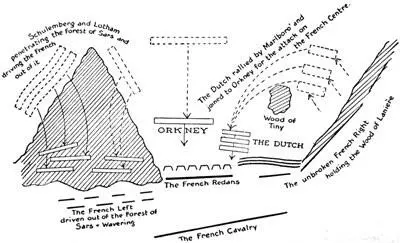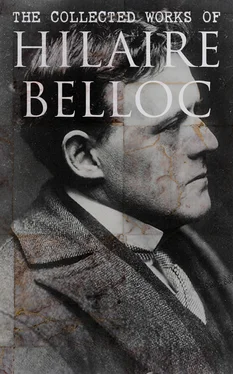The pressure upon the French in the wood of Sars, perpetually increasing, had already caused Villars, who commanded there in person, to beg Boufflers for aid; but the demand came when Boufflers was fighting his hardest against the last Dutch attack, and no aid could be sent.
Somewhat reluctantly, Villars had weakened his centre by withdrawing from it the two Irish regiments, and continued to dispute foot by foot the forest of Sars. But foot by foot and tree by tree, in a series of individual engagements, his men were pressed back, and a larger area of the woodland was held by the troops of Schulemberg and Lottum. Eugene was wounded, but refused to leave the field. The loss had been appalling upon either side, but especially severe (as might have been expected) among the assailants, when, just before one o’clock, the last of the French soldiers were driven from the wood.

Sketch Map showing Marlborough bringing up troops to the centre for the
final and successful attack upon the entrenchments about one o’clock.
All that main defence which the forest of Sars formed upon the French left flank was lost, but the fight had been so exhausting to the assailants in the confusion of the underwood, and the difficulty of forming them in the trees was so great, that the French forces once outside the wood could rally at leisure and draw up in line to receive any further movement on the part of their opponents. It was while the French left were thus drawn up in line behind the wood of Sars, with their redans at the centre weakened by the withdrawal of the Irish brigade, that Marlborough ordered the final central attack against those redans. The honour of carrying them fell to Lord Orkney and his British battalions. His men flooded over the earthworks at the first rush, breaking the depleted infantry behind them (for these, after the withdrawal of the Irish, were no more than the men of Bavaria and Cologne), and held the parapet.
The French earthworks thus carried by the infantry in the centre, the modern reader might well premise that a complete rout of the French forces should have followed. But he would make this premise without counting for the preponderant rôle that cavalry played in the wars of Marlborough.
Facing the victorious English battalions of Orkney, now in possession of the redans, stood the mile-long unbroken squadrons of the French horse.
The allied cavalry, passing between gaps in its infantry line, began to deploy for the charge, but even as they deployed they were charged by the French mounted men, thrust back, and thrown into confusion. The short remainder of the battle is no more than a mêlée of sabres, but the nature of that mêlée must be clearly grasped, and the character of the French cavalry resistance understood, for this it was which determined the issue of the combat and saved the army of Louis XIV.
A detailed account of the charges and counter-charges of the opposing horse would be confusing to the reader, and is, as a fact, impossible of narration, for no contemporary record of it remains in any form which can be lucidly set forth.
A rough outline of what happened is this:—
The first counter-charge of the French was successful, and the allied cavalry, caught in the act of deployment, was thrust back in confusion, as I have said, upon the British infantry who lined the captured earthworks.
The great central battery of forty guns which Marlborough had kept all day in the centre of the gap, split to the right and left, and, once clear of its own troops, fired from either side upon the French horse. Shaken, confused, and almost broken by this fire, the French horse were charged by a new body of the allied horse led by Marlborough in person, composed of British and Prussian units. But, just as Marlborough’s charge was succeeding, old Boufflers, bringing up the French Household Cavalry from in front of Malplaquet village, charged right home into the flank of Marlborough’s mounted troops, bore back their first and second lines, and destroyed the order of their third.
Thereupon Eugene, with yet another body of fresh horse (of the Imperial Service), charged in his turn, and the battle of Malplaquet ends in a furious mix-up of mounted men, which gradually separated into two undefeated lines, each retiring from the contest.
It will be wondered why a conclusion so curiously impotent was permitted to close the fighting of so famous a field.
The answer to this query is that the effort upon either side had passed the limits beyond which men are physically incapable of further action. Any attempt of the French to advance in force after two o’clock would have led to their certain disaster, for the allies were now in possession of their long line of earthworks. 14
On the other hand, the allies could not advance, because the men upon whom they could still count for action were reduced to insufficient numbers. Something like one-third of their vast host had fallen in this most murderous of battles; from an eighth to a sixth were dead. Of the remainder, the great proportion suffered at this hour from an exhaustion that forbade all effective effort.
The horse upon either side might indeed have continued charge and counter-charge to no purpose and with no final effect, but the action of the cavalry in the repeated and abortive shocks, of which a list has just been detailed, could lead neither commander to hope for any final result. Boufflers ordered a retreat, screened by his yet unbroken lines of horse. The infantry were withdrawn from the wood of Lanière, which they still held, and from their positions behind the forest of Sars. They were directed in two columns towards Bavai in their rear, and as that orderly and unhurried retreat was accomplished, the cavalry filed in to follow the line, and the French host, leaving the field in the possession of the victors, marched back westward by the two Roman roads in as regular a formation as though they had been advancing to action rather than retreating from an abandoned position.
It was not quite three o’clock in the afternoon.
There was no pursuit, and there could be none. The allied army slept upon the ground it had gained; rested, evacuated its wounded, and restored its broken ranks through the whole of the morrow, Thursday. It was not until the Friday that it was able to march back again from the field in which it had triumphed at so terrible an expense of numbers, guns, and colours, and with so null a strategic result, and to take up once more the siege of Mons. Upon the 9th of October Mons capitulated, furnishing the sole fruit of this most arduous of all the great series of Marlborough’s campaigns.
No battle has been contested with more valour or tenacity than the battle of Malplaquet. The nature of the woodland fighting contributed to the enormous losses sustained upon either side. The delay during which the French had been permitted to entrench themselves so thoroughly naturally threw the great balance of the loss upon the assailants. In no battle, free, as Malplaquet was free, from all pursuit or a rout, or even the breaking of any considerable body of troops (save the Dutch troops and Highlanders on the left in the earlier part of the battle, and the Bavarians and Cologne men in the redans at the close of it), has the proportion of the killed and wounded been anything like so high. In none, perhaps, were casualties so heavy accompanied by so small a proportion of prisoners.
The action will remain throughout history a standing example of the pitch of excellence to which those highly trained professional armies of the eighteenth century, with their savage discipline, their aristocratic command, their close formations, and their extraordinary reliance upon human daring, could arrive.
Читать дальше













